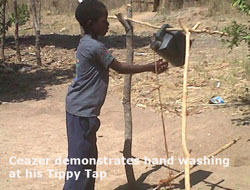Zambia-Kampondo
Grade 5 Pupil Inspires His Family and Surrounding Community about Hand Washing
Kampondo Basic School lies in the heart of Zambia’s Lundazi District, approximately 45 kilometers from the district education office. The school’s water, sanitation, and hygiene (WASH) committee members recently received sanitation and hygiene improvement training from the USAID-funded and WASHplus- implemented SPLASH (Schools Producing Learning Advancement through Sanitation and Health) project. They in turn shared their knowledge from the training with others at the school, including the WASH Club. 
“After undergoing WASH training, I thought of sharing and practicing what I leaned during the training at home,” says Ceazer Mtonga, a 12-year-old student in Grade 5 at Kampondo. Ceazer, a school WASH Club member, lives in a nearby compound that consists of more than 120 community members. The training inspired him to take up the challenge of educating his family and other members of the community on the importance of washing hands at critical times.
Ceazer demonstrated how to make a Tippy Tap hand washing facility out of a plastic jug for his own family and designed toilet lids to cover holes in latrines. Ceazer’s actions inspired his family, neighbors, and community members from other villages to make their own Tippy Taps and to keep their latrines clean. His efforts to spread the word about the importance of hand washing at critical times won him praise from his 45-year-old father Ackim Mtonga and the rest of the community.
“We didn’t know that hand washing was that important to our health. I never used to wash hands even when I am from using the toilet,” says Mr. Mtonga. “I am really proud of my son for enlightening us about this as we did not have an idea that hands and flies bridge the gap between fecal matter and food and in the final analysis lead to diarrheal diseases.”
The hygiene messages promoted by Ceazer, the school’s WASH committee, and its administration prompted community members to install their own home toilets and introduce toilet covers to their open latrines. Even homes without toilets have decided to place Tippy Taps in the bush. While their use started at Kampondo Basic School after WASH training, Tippy Taps are now a notable feature of the surrounding villages, even in the teachers’ compound.

